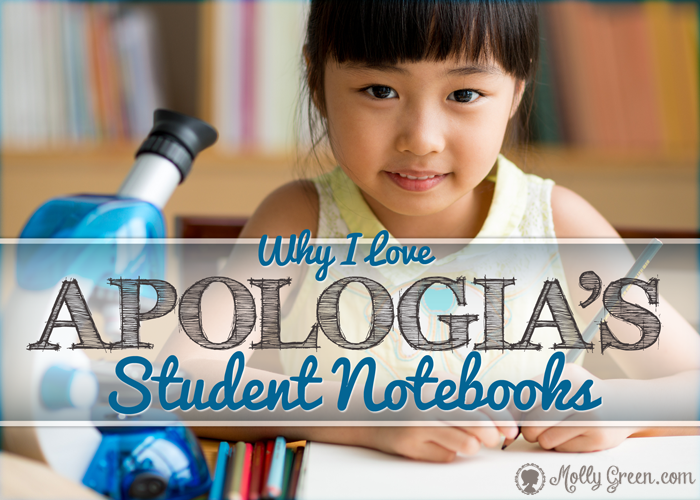By Leah Courtney
Our family has long loved using science curricula from Apologia. Their creation-based textbooks read more like living books than a dry textbook. Thanks to Apologia, I have at least one child who loves science enough to have declared it her college major. The only drawback to using Apologia for us has been what to do with a child who has more difficulty with reading comprehension. The Apologia science books are very “meaty” and can be difficult reading for kids who aren’t strong readers.
A few years ago, we discovered a great Apologia resource that helps with this. The student notebooks that have been created to use in conjunction with the science books have helped my kids to get a better understanding of the material they’re reading.
There are student notebooks available for both the elementary science books and for the high school books. The elementary books have a younger child version for K-2nd grade and an older version for 3rd/4th grades and up. Both levels of notebook have a suggested schedule in the front that gives a schedule for reading through the book in one year, two days a week. In the younger elementary version, students are given coloring pages, copywork, drawing pages, and lapbooking pages. The older version has puzzles such as word searches and crosswords as well as comprehension questions to answer, notetaking sections, and copywork. There are lapbooking pages in the older student version as well.
My younger girls have really enjoyed the notebooks. The coloring pages gave them something to do with their hands while I was reading when they were younger. Now the notetaking pages give them something to do as they listen for facts to record while I read aloud. We love lapbooking, so having the lapbooking pages to go along with our reading is fun as well as educational. The questions that are in the older version can be answered in the book, but we usually do them orally.
The upper level student notebooks also have a schedule that shows how much to read and which questions and labs to complete each day in order to make it through the book in a year. They have comprehension questions that come from the On Your Own sections in the books, charts to complete, study guide questions from the book with room to answer, pages to record labs, and notetaking pages. Although the On Your Own questions and study guide questions are also found in the textbook, it’s nice to have them all in one place with room to record answers.
The upper level notebooks have been really beneficial for my struggling reader as well as my more avid reader. Much of the trouble that kids have with comprehension as they begin reading more difficult information is that they don’t know what is important enough to remember. The notebooks help them to assimilate this information in a way that makes it easier to remember. They also encourage notetaking and help kids learn how to record information from labs that they complete.
I love the student notebooks from Apologia because they make my job easier. Even just having the schedule already laid out saves me so much time. They also have this great collection of notetaking and review activities that expand the reading from the book. Yes, I could take time to come up with this on my own, but they’ve done it for me. And it’s packaged in a great, easy to use notebook that can be used throughout the school year and then saved as part of our school records for the year.
Leah is a homeschooling mom of four children. Teaching, homemaking and providing a taxi service to a multitude of activities keep her pretty busy. She also enjoys reading, blogging, and reviewing books and homeschool curricula. She writes about all of these things at As We Walk Along the Road.
Apologia Student Notebooks for Science Courses
6 thoughts on “Apologia Student Notebooks for Science Courses”
Leave a Comment
You must be logged in to post a comment.






I love the Apologia Student Notebooks–so do the kids! I use them w/ my older kids–I’ll have to try them w/ the younger! Thanks 🙂
Glad you enjoyed it, Lisa! The Apologia notebooks are a big help for keeping organized and comprehending the material. Thanks for reading!
Molly Green Staff
I also love the notebooks. My children are not fond of them. I think they thought they were tedious. Maybe I should have not made them do the mini-books and they wouldn’t have minded so much. My mistake for pushing so much on them. My eldest was eight at the time.
I am also homeschooling my teenage brother using the Apologia science with the student notebook and I think it has been beneficial for him. He is able to go back and think about what has been read. The student notebook is worth the money. The benefits outweigh the cost in the long run.
They are super helpful for me as well, Ruthie! The books might become more useful as the student matures and the material becomes more weighty. Thanks for reading!
Molly Green Staff
Love Apologia! This is our third year and we started use the audio CDs that com separately because we have a kid who isn’t a fan of reading. We all listen together – the child who prefers to read reads along, the audio learner just listens. We stop and discuss the material frequently. We also have one kid who loves everything about the notebook (7th grade) and one who loves everything except the free writing (5th grade). Like everything it depends on the child.
All the different resources available to facilitate learning are amazing. Sometimes different methods will work better with different children, so if the notebooks or CDs work, that’s terrific! Thanks for reading, Dianne!
-Molly Green Staff